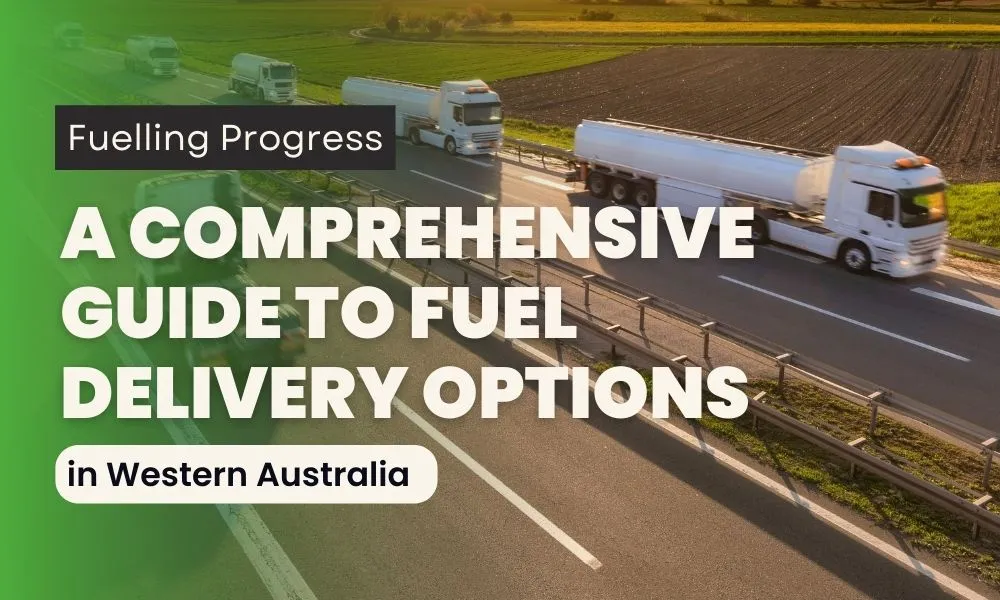
The vast expanse of Western Australia, where industries thrive and landscapes vary from urban centres to remote regions, accessible and reliable fuel delivery is crucial for sustaining progress. The smooth functioning of businesses, agricultural activities, and essential services relies on a seamless and dependable supply of fuel. This article explores the diverse fuel delivery options available in
Western Australia, highlighting the significance of each in contributing to the progress of the region.
Western Australia boasts a rich tapestry of industries, each with unique fuelling needs. From bustling urban centres to the vast, remote expanses, the region requires a range of fuel delivery solutions. This article provides a comprehensive overview of the varied options available to businesses, ensuring they can choose the most suitable and efficient method for their specific requirements.
This article aims to serve as a definitive guide to fuel delivery options in Western Australia, offering insights into traditional methods, modern solutions, and environmentally responsible practices. It will help businesses and industries make informed decisions about their fuel procurement strategies, considering factors such as accessibility, efficiency, and sustainability.
Traditional Fuel Delivery Services
Traditional fuelling stations and retail locations remain prevalent in both urban and regional settings, providing a convenient option for individual consumers and businesses alike. These stations offer a range of fuel types and ancillary services, contributing to the accessibility of fuel across Western Australia.
While in-person fuel purchases offer convenience, especially in urban areas, they may pose challenges in remote regions. The reliance on physical locations could lead to increased costs and logistical difficulties. However, the immediacy and ease of access make traditional fuelling stations a viable option for many.
The availability of traditional fuelling stations varies between urban and remote areas. While urban centres boast numerous options, remote regions often face limitations. Understanding the distribution of these services is vital for businesses operating in diverse landscapes.
Bulk Fuel Delivery
Bulk fuel delivery involves the transportation of large quantities of fuel directly to a customer’s site. This method offers several benefits, including cost-effectiveness, reduced downtime, and the convenience of having fuel delivered directly to the point of use.
Bulk fuel delivery is particularly advantageous for industries with high fuel consumption, such as construction, mining, and agriculture. Businesses operating in remote areas also benefit from the reliability and efficiency of bulk fuel services.
The cost-effectiveness and time-saving advantages of bulk fuel delivery stem from reduced transportation costs, streamlined logistics, and the ability to schedule deliveries based on operational needs. This option ensures a steady and efficient fuel supply, even in remote or challenging environments.
On-Site Fuelling Services
Mobile fuelling, or on-site fuelling, is a modern solution that brings the fuel station directly to businesses and operations. This method eliminates the need for travel to fuelling stations, offering convenience and efficiency.
On-site fuelling is particularly beneficial for fleets, construction sites, and remote operations. It minimises downtime, enhances operational efficiency, and provides a tailored solution for businesses with specific fuelling requirements.
The primary advantages of on-site fuelling include convenience and reduced downtime. Businesses can optimise their operations by eliminating the time spent travelling to and from fuelling stations, resulting in increased productivity and cost savings.
Sustainability and Environmental Responsibility
As environmental consciousness grows, fuel delivery services are embracing eco-friendly practices. This section explores initiatives such as the use of biofuels, electric vehicles, and other sustainable options that contribute to reducing the carbon footprint of fuel delivery.
The adoption of sustainable fuel delivery options plays a crucial role in reducing carbon emissions and minimising the environmental impact of the fuel industry. Businesses can align with these initiatives to demonstrate a commitment to environmental responsibility.
Governments in Western Australia are increasingly promoting green fuels and sustainable practices. This section outlines relevant regulations and incentives that encourage businesses to opt for eco-friendly fuel delivery options, contributing to a cleaner and greener future.
Emergency Fuel Delivery Services
Emergency fuel delivery services are critical for businesses facing unexpected fuel shortages. This section highlights the importance of having a reliable emergency fuel delivery plan in place, ensuring continuity during unforeseen circumstances.
The availability and rapid response times of emergency fuel delivery services are essential in situations where immediate refuelling is crucial. This section discusses how businesses can access these services promptly, even in remote regions of Western Australia.
For businesses operating in remote regions, accessing emergency fuel services can be challenging. This section provides insights into strategies and options available to ensure that businesses in these areas are not left without a vital fuel supply during emergencies.
Cost and Pricing Considerations
Analysing the cost of various fuel delivery options is essential for businesses seeking the most economical solution. This section breaks down the costs associated with traditional fuelling stations, bulk fuel delivery, on-site fuelling, and emergency fuel services.
Several factors influence fuel delivery pricing, including distance, volume, and service type. Understanding these factors enables businesses to make informed decisions based on their specific requirements and budget constraints.
To optimise fuel procurement costs, businesses can implement various strategies. This section offers practical tips for cost-effective fuel procurement, ranging from negotiating favourable contracts to leveraging government incentives for sustainable fuel practices.
“Fuelling Progress: A Comprehensive Guide to Fuel Delivery Options in Western Australia” serves as an invaluable resource for businesses navigating the diverse landscapes of the region. By understanding the intricacies of traditional and modern fuel delivery services, businesses can make informed decisions that not only meet their immediate fuel needs but also contribute to the sustainable progress of Western Australia.
